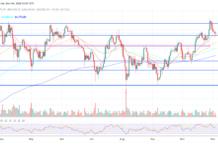The world’s largest crypto exchange Binance on Monday announced the removal of 39 liquidity pools from its Binance Liquid Swap. Major coins and tokens removed from liquidity pools are Cardano (ADA), Polygon (MATIC), Bitcoin (BTC), Tron (TRX), Avalanche (AVAX), Polkadot (DOT), Filecoin (FIL), and Pepe Coin (PEPE),
Binance Announces Liquidity Pool Removal
Crypto exchange Binance in an official announcement on August 28 revealed plan to remove 39 liquidity pools. Typically, Binance periodically adds and removes crypto from its products and services. However, the U.S. SEC and CFTC lawsuits and regulatory challenges have forced Binance to make these changes as trading volumes and liquidity fell significantly.
“We periodically review listed liquidity pools to concentrate liquidity for our users and ensure optimized trading experience, price and slippage.”
Binance will remove 13 BNB pairs from liquidity pool on September 1 at 04:00 UTC. These are ADA/BNB, MATIC/BNB, FIL/BNB, AVAX/BNB, TRX/BNB, CHZ/BNB, CTSI/BNB, GALA/BNB, NEO/BNB, SUSHI/BNB, SXP/BNB, THETA/BNB, and ICP/BNB.
Pairs in Bitcoin and Ethereum pairs are ALICE/BTC, APE/BTC, CHZ/BTC, ID/BTC, SUSHI/BTC, SXP/BTC, THETA/BTC, and TRX/ETH.
Other liquidity pools include BTC/TUSD, DOT/BUSD, FRONT/BUSD, AVA/USDT, ENJ/USDT, KDA/USDT, LIT/USDT, PAXG/USDT, PEPE/USDT, SANTOS/USDT, TKO/USDT, and TLM/USDT.
Users will not be able to add liquidity into the above liquidity pools starting today. Also, users having positions in the above liquidity pools will receive their deposited assets in their wallets on September 1.
Meanwhile, Binance plans to make changes to its zero-fee Bitcoin trading for BTC/TUSD spot and margin trading pair. The move may likely trigger another major selloff as trading volumes will take a hit similar to a 90% trading volume fall after the termination of zero-fee trading by Binance in March.
Also Read:
The presented content may include the personal opinion of the author and is subject to market condition. Do your market research before investing in cryptocurrencies. The author or the publication does not hold any responsibility for your personal financial loss.








